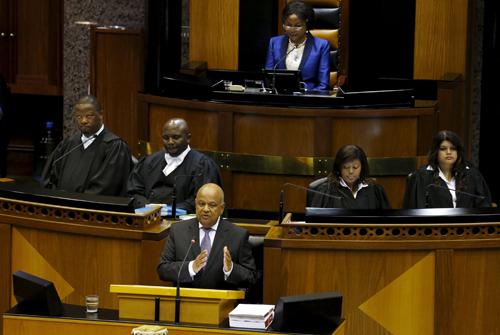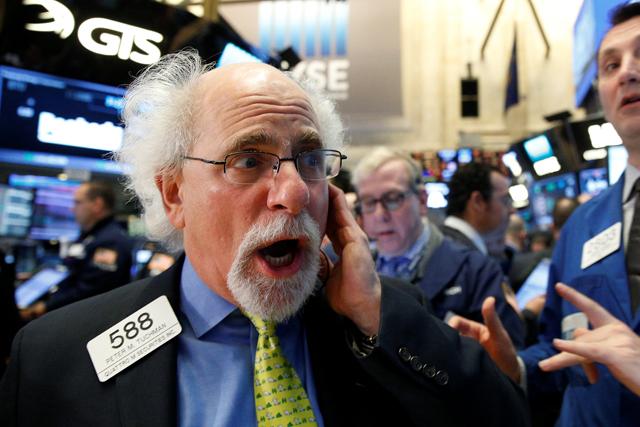You are here
South Africa 'crisis' budget hikes taxes, targets state spending
By AFP - Feb 25,2016 - Last updated at Feb 25,2016

South Africa's Finance Minister Pravin Gordhan delivers his 2016 budget address to the parliament in Cape Town, on Wednesday (Reuters photo)
CAPE TOWN — South Africa's finance minister on Wednesday hiked taxes and targeted what he called wasteful and corrupt government spending in a "crisis" budget, aimed at staving off a ratings downgrade to junk status.
Africa's most developed economy is struggling with shrinking growth, unemployment running at 25 per cent, and widespread poverty.
"We cannot spend money we do not have. We cannot borrow beyond our ability to repay," Finance Minister Pravin Gordhan told parliament. "Until we can ignite growth and generate more revenue, we have to be tough on ourselves."
In a press conference before he delivered the budget, Gordhan was even more direct.
"There is no doubt about the fact that we are in crisis," he said.
The local rand currency fell by 2.25 per cent against the dollar shortly after the minister spoke to parliament.
"I expected a much firmer austerity budget," Mohammed Nalla, head of strategic research at Nedbank, told AFP. "This budget will not be enough to help us avoid a credit downgrade in the near future, but it may have helped us buy a bit of time."
Presenting the budget, Gordhan announced greater cooperation with the private sector in an effort to boost growth, which he forecast would drop to below one per cent this year.
Although he denied moving towards privatisation, the minister opened the way for private sector investment in under-performing state-owned enterprises.
These include the loss-making national carrier South African Airways, long a target of government critics.
Increased taxes on excise duties, capital gains, fuel, sugary drinks, alcohol and tobacco and environmental levies are expected to bring in an extra 18 billion rand ($1.18 billion).
Personal income tax was not increased, but "current taxes on wealth are under review", Gordhan said.
The government spending ceiling will be cut by 25 billion rand ($1.64 billion) over the next three years, mainly by trimming posts in the bloated public service.
Confidence issues
Government corruption will be tackled through a crackdown on tender processes, while wasteful expenditure clamps will extend to a downgrade in the value of cars bought for politicians.
Abuses in the private sector will also be targeted.
"We will continue to act aggressively against the evasion of tax through transfer pricing abuses, misuse of tax treaties and illegal money flows," Gordhan said.
Winning the confidence of the ratings agencies, which help determine how much countries pay to borrow money, was made more difficult when President Jacob Zuma shocked markets in December by firing two finance ministers within four days.
Gordhan, who was widely respected when he held the position from 2009 to 2014, was recalled in a panicked attempt to limit the damage to the country's credibility.
In an immediate reaction to the budget, the main opposition party, the Democratic Alliance, said the minister had "announced no significant new measures to boost economic growth and create jobs".
Gordhan faced the difficult balancing act of trying to please both the financial world and a government facing voters in municipal elections this year.
He said in his press conference that spending cuts would be made without affecting social services.
South Africa is regularly rocked by protests over service delivery for the poor, and in the past year the unrest has spread to university campuses with students pressing for free education.
Gordhan announced an extra 16 billion rand ($1.05 billion) for higher education, saying "we are crafting solutions to the voices of students regarding fees and housing."
A central objective of the budget was to stabilise debt as a percentage of gross domestic product (GDP), he said.
"Net national debt is projected to stabilise at 46.2 per cent of GDP in 2017/18, and to decline after that," the minister added.
Efforts are also being made to rein in the budget deficit, which is expected to be 3.2 per cent of GDP this year on total spending of 1,324 billion rand ($86.9 billion), declining to 2.4 per cent in 2018/19.
Apart from policy missteps, the resource-rich economy has been hard hit by falling commodity prices on reduced demand by China, and an agricultural sector hobbled by the worst drought in more than a century.
Related Articles
LONDON — European shares edged lower on Tuesday, after falls on Asian bourses, and low-risk government debt yields fell as political risks f
Africa is "taking off" with strong, steady growth but poverty is unacceptably high so that governments need to build infrastructure and institutions and educate people to share the benefits more widely, the head of the International Monetary Fund (IMF) said on Thursday.
BENGALURU — Emerging market stocks hit one-week highs on Wednesday as a strong start to the US corporate earnings season encouraged investor


















